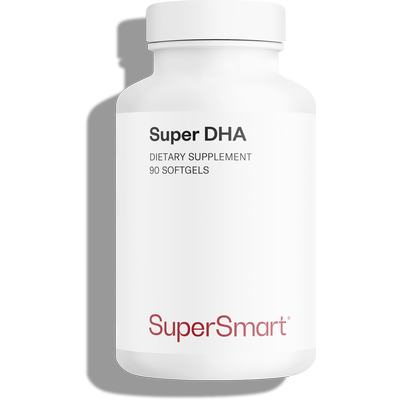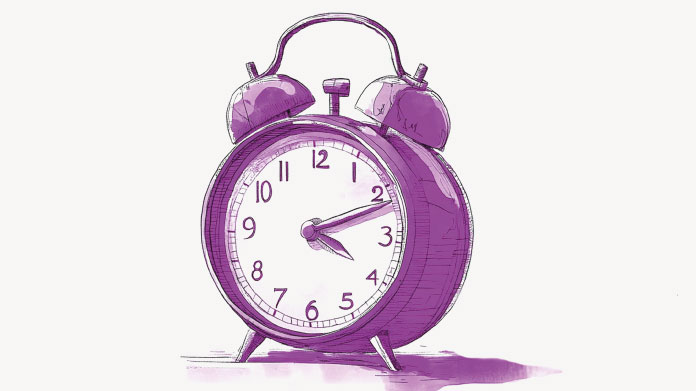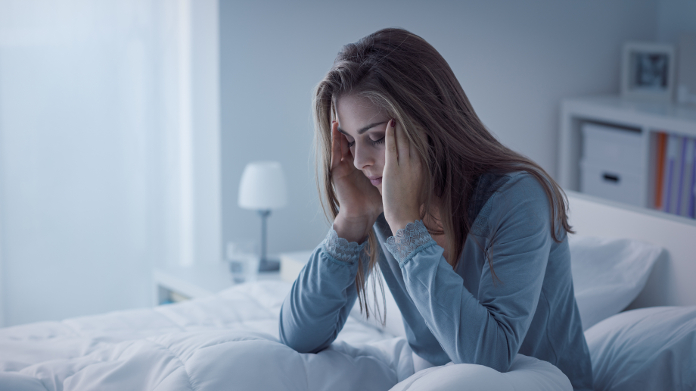Sleep: studies suggest that DHA resets the biological clock
Insomnia, frequent sleep problems? According to a recent study, an omega-3 fatty acid, DHA, could help you better regulate your sleep-wake rhythm...

The biological clock and circadian rhythms: what you need to know
The conductor of the sleep-wake rhythm
Our brain has a biological clock located in the suprachiasmatic nucleus (SCN) of the hypothalamus. It governs our sleep-wake cycle.
In practical terms, it regulates our days, much like a natural clock. It gives signals to our nervous system to organise our waking and sleeping times and modulate our appetite.
These are known as circadian rhythms, which extend over a cycle of around 24 hours (1).
Regulating the biological clock: light and non-light triggers
The role of light
The biological clock regulates itself according to the alternation of day and night. It is determined by the light to which we are exposed.
Our eyes detect the intensity and colour of the light, then transmit the information to the central nervous system, which in turn adjusts the biological clock accordingly.
So, even when you travel to a country with a large time difference from your usual place of residence, it automatically adjusts to the new times of day and night.
This mechanism also explains why exposure to both natural and artificial light can make it easier to wake up or, on the contrary, harder to fall asleep (2).
But light is not the only factor that influences the way the biological clock regulates its functioning.
Non-light regulators
The regulation of the internal clock is also influenced by non-luminous stimuli (or non-photic zeitgebers) (3):
- physical activity, which can advance or delay the clock depending on the time of day
- mealtimes, which send signals to the body about the availability of energy and influence specific clock genes
- certain nutrients, which can directly or indirectly modulate the expression of genes regulating sleep-wake cycles (4)
Among the nutrients, omega-3 fatty acids, particularly of the DHA type, are thought to be powerful synchronisers, modulating our biological rhythms according to what we eat.
Studies explore the links between sleep and DHA consumption
Omega-3 fatty acids and sleep
There are two main types of omega-3 fatty acids: eicosapentaenoic acid (EPA) and docosahexaenoic acid (DHA).
These are essential components of cell membranes, particularly in the brain, where they are involved in communication between neurons (5).
Recent scientific data shows that omega-3s, and DHA in particular, can influence the synchronisation of the circadian clock (6).
They act on the clock genes responsible for modulating circadian rhythms, but also on metabolic regulation, affecting hormone release and energy management.
These effects have been observed in both human and animal models.
A more specific role for DHA in sleep quality
A randomised controlled trial (7) highlighted a specific effect of DHA (but not EPA) on sleep quality in healthy adults.
Among participants in this study who took DHA, there was:
- an improvement in sleep efficiency, i.e. the proportion of time spent in bed actually devoted to sleep
- a reduction in the time taken to fall asleep
- a reduction in the fragmentation index, i.e. the number of awakenings during the night
The results therefore suggest that DHA not only helps us to fall asleep more quickly at bedtime, but also to stay asleep throughout the night.
Mechanisms of action and future prospects: the promising role of DHA
How could DHA promote good quality sleep?
As we have seen, research suggests that DHA acts on circadian genes.
These are the genes that regulate the sleep–wake cycle and coordinate many of the body's functions.
At the same time, DHA is a fatty acid that is incorporated into the membranes of our nerve cells.
This could influence communication between neurons and, indirectly, the production of melatonin and serotonin (8), two neurotransmitters.
Melatonin is the hormone secreted by our body to indicate to the nervous system that it is time to prepare for sleep.
It is also responsible for keeping us asleep throughout the night. It is therefore essential for regulating the biological clock.
For its part, serotonin is not only involved in the production of melatonin, but also in mood regulation (9), which can have an impact on how easily we fall asleep.
Increasing your intake of DHA could therefore help you to better synthesise these two hormones, indirectly influencing the sleep-wake cycle.
![]() Discover the Super DHA food supplement, which contains a high concentration of DHA for targeted intake.
Discover the Super DHA food supplement, which contains a high concentration of DHA for targeted intake.
Further research needed
Researchers are taking a close look at how DHA can affect our biological rhythms.
However, it is important to remain cautious. The results depend on a number of factors:
- the dose of fatty acids consumed
- the profile of the participants (age, state of health, basic diet)
- the duration of the clinical trials
Today, the data is still limited and needs to be confirmed by targeted, larger-scale research.
While DHA could well play a role in regulating sleep-wake rhythms, its use is only one avenue of research and not an established certainty.
SUPERSMART ADVICE
References
- https://www.inserm.fr/dossier/chronobiologie/
- Blume C, Garbazza C, Spitschan M. Effects of light on human circadian rhythms, sleep and mood. Somnologie (Berl). 2019 Sep;23(3):147-156. doi: 10.1007/s11818-019-00215-x. Epub 2019 Aug 20. PMID: 31534436; PMCID: PMC6751071.
- Checa-Ros A, D'Marco L. Role of Omega-3 Fatty Acids as Non-Photic Zeitgebers and Circadian Clock Synchronizers. Int J Mol Sci. 2022 Oct 12;23(20):12162. doi: 10.3390/ijms232012162. PMID: 36293015; PMCID: PMC9603208.
- Oosterman JE, Kalsbeek A, la Fleur SE, Belsham DD. Impact of nutrients on circadian rhythmicity. Am J Physiol Regul Integr Comp Physiol. 2015 Mar 1;308(5):R337-50. doi: 10.1152/ajpregu.00322.2014. Epub 2014 Dec 17. PMID: 25519730; PMCID: PMC4346762.
- Valentine RC, Valentine DL. Omega-3 fatty acids in cellular membranes: a unified concept. Prog Lipid Res. 2004 Sep;43(5):383-402. doi: 10.1016/j.plipres.2004.05.004. PMID: 15458813.
- Jackson P. Omega-3 fatty acids and sleep: recent advances in understanding effects and mechanisms. Curr Opin Clin Nutr Metab Care. 2025 Mar 1;28(2):61-65. doi: 10.1097/MCO.0000000000001095. Epub 2024 Dec 2. PMID: 39749934.
- Patan MJ, Kennedy DO, Husberg C, Hustvedt SO, Calder PC, Middleton B, Khan J, Forster J, Jackson PA. Differential Effects of DHA- and EPA-Rich Oils on Sleep in Healthy Young Adults: A Randomized Controlled Trial. Nutrients. 2021 Jan 16;13(1):248. doi: 10.3390/nu13010248. PMID: 33467135; PMCID: PMC7830450.
- Patrick RP, Ames BN. Vitamin D and the omega-3 fatty acids control serotonin synthesis and action, part 2: relevance for ADHD, bipolar disorder, schizophrenia, and impulsive behavior. FASEB J. 2015 Jun;29(6):2207-22. doi: 10.1096/fj.14-268342. Epub 2015 Feb 24. PMID: 25713056.
- Michely J, Eldar E, Martin IM, Dolan RJ. A mechanistic account of serotonin's impact on mood. Nat Commun. 2020 May 11;11(1):2335. doi: 10.1038/s41467-020-16090-2. PMID: 32393738; PMCID: PMC7214430.
1 Days
very good expereince
very good expereince
Jelena Đaković
1 Days
Very good products.
Very good products.
Agnes BENDSAK
3 Days
Just OK
Just OK, ordering from company for many years and being safisfied
Lynn Mae
4 Days
Recomendo
Produtos encomendados são recebidos atempadamente e de acordo com o anunciado! Muito satisfeita!
Carla Sofia
4 Days
Everything is great!
Everything is great!
Jonas
9 Days
The delivery was fast and the product…
The delivery was fast and the product is great
SOMMARIVA Gianni
10 Days
Great service and lots of information
Great service and lots of information
Gabi
13 Days
Service Satisfaction
I’m satisfied with the service; it fulfilled what it set out to do.
Anfhony Abreu
16 Days
Original product and fast delivery
Original product and fast delivery. I haven't started it yet, but will do soon.
Vincenza Catania
19 Days
Good quality
Good quality. Good service.
Leonel Guzman
21 Days
Top!!!!!!!!
Top!!!!!!!!
Michael
23 Days
Excellent!
Products are great and delivered fast!
PARDINI Debora
24 Days
From order to receive the product
From order to receive the product, the process is smooth & fast. It’s good to customers.
WONG Mei Ling
25 Days
Fast delivery
very quick delivery to italy. product is good.
Customer
26 Days
Prompt delivry !!👍
Prompt delivry !!👍
SWEET Christine
of experience
your money back
##montant## purchase





